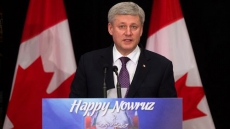TORONTO — Canada's dairy industry is monitoring but so far not concerned about the decision by the country's new Liberal trade minister to review the $4.3 billion in compensation it has been promised to help offset the impact of the Trans-Pacific Partnership.
International Trade Minister Chrystia Freeland told reporters at an international conference in Manila that the dairy farmers' compensation package was under review as part of a wider consultation on the impact of the 12-country trade deal, signed under former prime minister Stephen Harper.
During the election campaign, Harper promised $4.3 billion over 15 years to a dairy industry concerned that low-cost imports could displace their products from the Canadian market.
That pledge followed a protest in September in which dairy farmers walked their cows on Parliament Hill, parked tractors on the streets of Ottawa and dumped milk on the pavement to express opposition to the agreement.
Canada's protected dairy sector remains mostly intact under the Trans-Pacific Partnership deal. However, imports will be allowed to fill an additional 3.25 per cent of the market over five years, displacing about 250 million litres of Canadian milk.
That's in addition to 17,700 tonnes of cheese permitted under a separate trade deal with Europe. Still, 86.75 per cent of dairy products sold in Canada will remain domestically sourced and protected by production, price and import controls, according to a report from RBC Capital Markets analyst Irene Nattel issued when the deal was announced in October.
Isabelle Bouchard, spokeswoman for the Dairy Farmers of Canada, said her group has already been in contact with the government about the TPP review.
"They told us that we will be consulted when they are ready to review the compensation package," she said.
Bouchard said opening up Canada's dairy market to more imports will undercut local producers, taking away Canadian jobs and hurting the agricultural industry as a whole, and that the government seems to recognize such concerns.
"From the discussions we had with the government this morning, we do not have to be worried," she said.
Dairy producers put pressure on the federal government during the TPP negotiations through representatives of the dairy-producing provinces, which did not have a seat at the table but still attended negotiations to push their provincial agendas.
Francois Dumontier, spokesman for Les Producteurs de lait du Quebec, said the $4.3 billion over 15 years was the minimum needed to compensate for the impact on the industry, and amounts to less than $300 million per year in an industry that employs nearly 300,000 people.
"The impact is permanent," he said.
Dumontier said he expected the government to stand by the promise and that the money was meant to offset both the TPP and the trade deal between Canada and the European Union.
"In both agreements, the dairy industry has been sacrificed to give market access to other industries," he said.
Dumontier said that it was clear from the start of both negotiations that agricultural subsidies in the EU and the United States were off the table, so he doesn't understand why Canada agreed to change its supply management policies.
Federal government officials did not respond to a request for comment.






